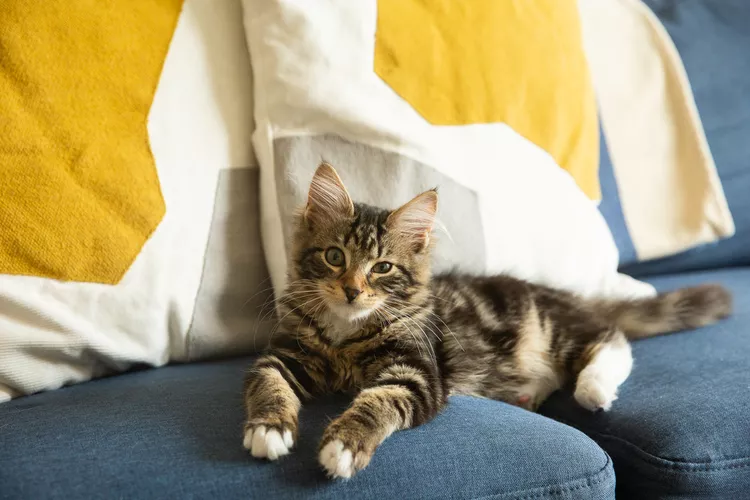
Your new kitten will go through some notable changes from six months to one year of age. She will be more confident and comfortable to freely explore her environment and voluntarily play with other existing pets and you.
Your kitten will also start growing into her features and begin to look more like an adult cat. However, that doesn't mean she is done growing physically or mentally, so be sure to continue positively reinforcing good behaviors. You'll also want to consider her diet and the timing for gradually transitioning into adult cat food.
At six months of age, your kitten may look like a little adult, but that doesn't mean it has reached adulthood. The basic rule of thumb is that the average-sized cat will gain about one pound per month, so at six months of age, your kitten should weigh about six pounds with a lanky torso and legs. It may seem a little disproportionate, but your kitten will soon grow into its long legs and body, just like a human preteen does.
At this age, your kitten should also have received all of its vaccinations and you should be thinking about scheduling its spay or neuter. While not yet fully grown in size, sexual maturity can occur at six months of age. To avoid having a male kitten that sprays urine to mark its territory or a female kitten that goes into heat, you'll want to get your male kitten neutered or your female kitten spayed as soon as possible. These are routine surgeries that will be performed by your veterinarian.
Baby teeth may still be present, but some kittens will lose them all by the time they are six months old. Some veterinarians will recommend extracting any baby teeth that remain in your kitten's mouth when it gets spayed or neutered.
Still very much a baby, but growing into a young adolescent, your kitten will start to sleep more during the day just like an adult cat does. Expect more than half the day to be filled with cat naps, so try to have a comfy cat bed in your kitten's favorite spot.
When your kitten isn't sleeping, it will still be exploring and playing, but its confidence level will be higher than when it was just a toddler. It will also be more coordinated as a young adolescent and will demonstrate just how social it wants to be with you. Socialization and bonding time have always been important to your growing kitten, but at this age, your hard work will have finally paid off, and you may see your kitten starting to snuggle with you voluntarily.
If you have not already had your female kitten spayed, and it has spent time with an intact male cat, then there is a chance that your kitten is pregnant. Cats can get pregnant as young as six months of age, so it's very important to get your female kitten spayed if you don't want more kittens.
Your kitten may start to play more with other pets in your house since its confidence is at an all-time high. Supervision is still a necessity though, as larger pets like dogs can still do damage to an eight-month-old kitten.
Be aware that your kitten is now large enough to attempt counter surfing, it may push items around or off of tables out of curiosity, and it will test the limits of both human and inanimate objects. Setting boundaries and being consistent in any training with your kitten is important. Kittens do not respond to force, so if you are trying to train it to do or not do something, you'll need to use positive reinforcement and patience to get the outcome you want. Verbal praise and tasty cat treats can go a long way in cat training.
By nine months of age, your adolescent kitten is almost full grown and all of its baby teeth should be gone. Teething should cease, but your kitten may still discover how fun it is to chew on things. Monitor your kitten's biting and chewing behaviors closely and make sure they do not get out of hand. Your kitten should never bite a person or other pet unwarranted. If aggressive behaviors start to show, then be sure to nip them in the bud right away and start training your kitten not to bite.
Making the switch from kitten to adult food can occur at any time now. This transition should be a slow one, though, and careful thought should go into which adult food you want to feed your kitten.
Be sure to choose a high-quality, meat-based adult cat food for your kitten. Your veterinarian may have specific brand recommendations for you, but otherwise, look for a major brand that is formulated for adult cats and has the AAFCO seal on the package. These things all indicate that the food is a good choice. Major food brands have quality control, customer service, veterinarians on staff, and high-quality ingredients. Generic or store-brand foods may have lower-quality ingredients and do not provide proper nutrition to your kitten. The food you choose should also list meat as the first ingredient since cats are carnivores.
Slowly mix the remaining kitten food you have with the new adult cat food. Allow there to eventually be more adult cat food then there is kitten food. This transition should take at least a week to decrease the likelihood of dietary-induced diarrhea and during this time, you should also monitor your kitten's appetite to ensure it's still eating the adult food and not just picking out the kitten food.
Almost a year of growth has occurred already, and now, your kitten is just about fully grown. It is sexually mature, eating adult cat food, has received all of its vaccinations, and you are consistently working on its social skills and training. It is equivalent to a teenage human at this point, so while it still has some mental maturing to do, it looks like an adult cat.
At one year of age, most people will now consider your kitten an adult cat. Most cats are full-grown by one year of age, so from here on out, your cat will simply grow mentally. Learning and training never end. Your cat will always explore, make decisions, play, and develop both good and bad habits, and it is up to you to steer it in the direction you would like it to grow. Remember to always use gentle and positive training methods and a good scratch behind the ears can go a long way!
By six months, your kitten will have its adult teeth; this is the most certain way to know how old your kitten is. (They start emerging in the third or fourth month, near their kitten/milk teeth, so the inside of their mouths look a little like a scene from Jaws when it's happening!)
Kittens are litter trained long before they are six months old. Worried yours won't be? Carry it to the box, and swish its paw in the litter. Voila! Your cat has been trained.
Slowly! Start by keeping them apart, but gradually introducing them by scent: rub a t-shirt on each, then share with the other. The kitten should be kept in its own room, if possible, or the bathroom. Let them see each other through a slightly ajar door. If there's hissing, that's normal, just close the door and try again tomorrow. If they seem to tolerate each other, gradually open the door further. If not, a pheromone plug-in like Feliway might help ease the tension. Worst case scenario, they will come to tolerate each other. Best case, they will become friends.
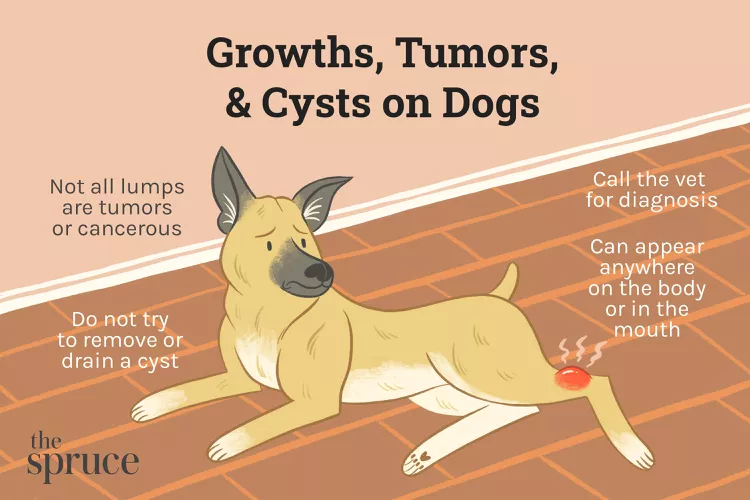
Tumors, Growths, and Cysts in Dogs
Tumors, lumps, growths, or cysts are commonly found on dogs. Learn the causes, treatments, and preventative measures.
Eye Injuries and Infections in Dogs
Dogs can suffer eye injuries that range from mildly irritating to serious medical emergencies. Learn the causes, treatment, and prevention.
Vestibular Disease in Dogs
Vestibular disease affects a dog's balance and eye movements. Find out about the signs, causes, and treatment of vestibular disease in dogs.
Is Acetaminophen Safe for Dogs?
Acetaminophen is used by humans for pain and fever relief, but is it safe for dogs? Here's what you need to know before giving your dog acetaminophen.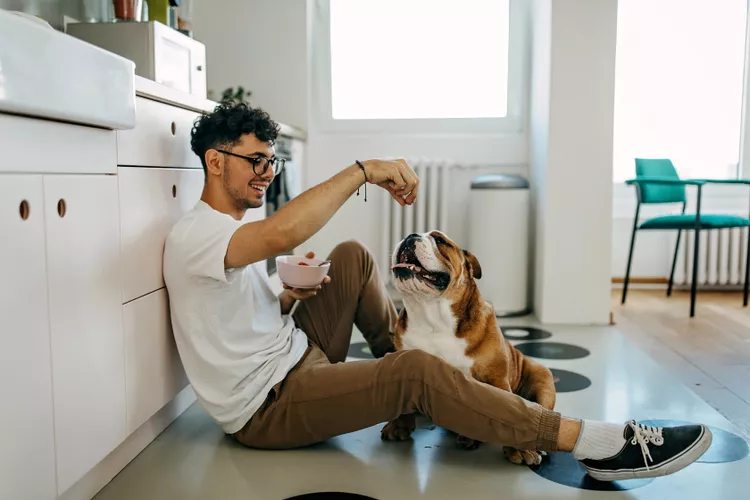
Can Dogs Eat Zucchini? Everything to Know About This Hardy Summer Squash
Zucchini is a nutritious food that's safe for dogs to eat in moderation. This low-calorie, high-fiber vegetable can be incorporated as a healthy treat in a dog's balanced diet. Learn more about its health benefits, potential risks, and how to prepare it.
Can Dogs Eat Popcorn? What You Need to Know for Movie Night
Dogs can eat popcorn, but there are safety concerns. Find out how to safely feed your dog popcorn and what you should do if you're concerned.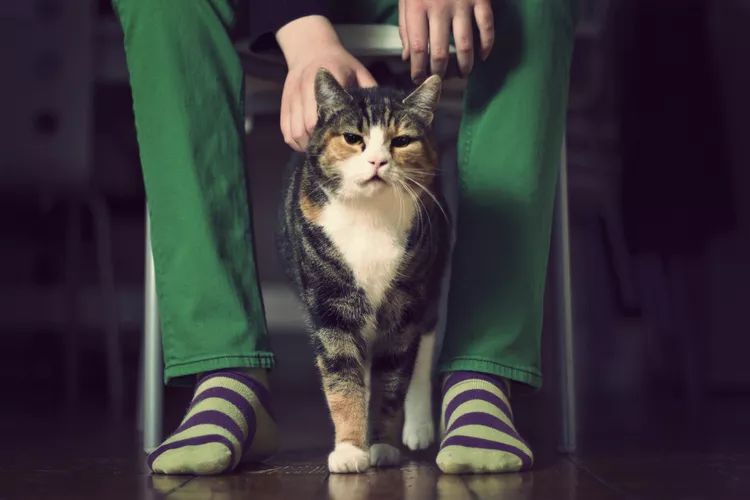
65 Irish Cat Names
Irish cat names can pay homage to historical places, local cuisine, famous Irish actors and musicians, or other wonderful aspects of the Emerald Isle.
46 Egyptian Cat Names
Whether inspired by notable Egyptian deities, locales, or pharaohs, Egyptian cat names can bring out the divinity of your noble feline companion.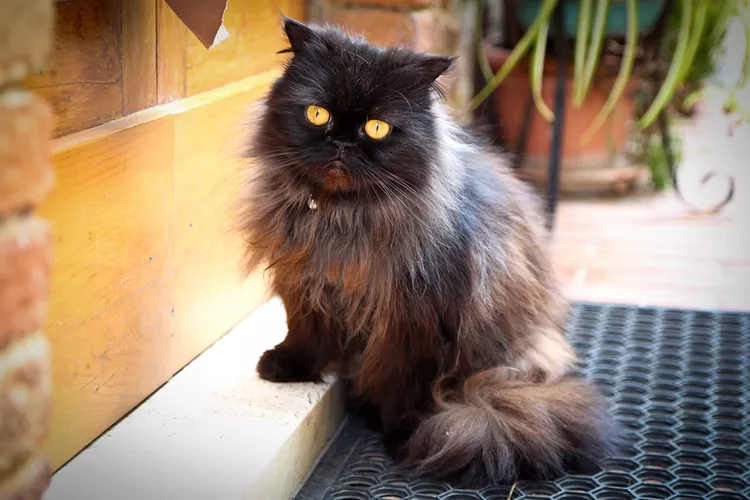
Are Ant Traps Safe for Cats?
Here's how to know if ant traps are safe for cats and how to keep yours free from harm if you have an ant problem.
The 6 Best Cat Nail Clippers of 2024 for a Safe Trim
Clipping your cat's nails can save your furniture and keep your kitty comfortable. We asked veterinarians for their cat nail clipper recommendations.
Is Neosporin Safe for Cats?
A brief summary of concerns a cat owner should be aware of before putting Neosporin on their cat, plus tips for things they can use at home instead.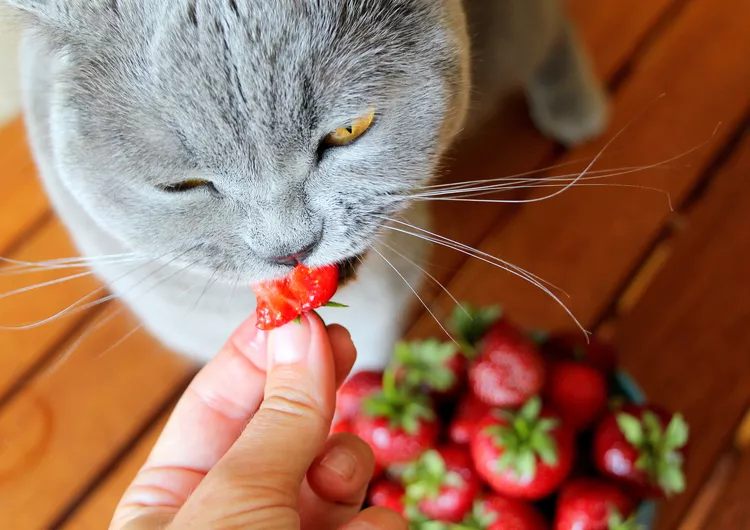
Can Cats Eat Strawberries? How to Safely Share This Summer Berry
Although cats are primarily meat eaters, strawberries may be an interesting and tasty snack for your feline friend. Find out the risks of feeding strawberries to cats and how to safely let your cat enjoy this fruit.
Cute Pictures & Facts About Calico Cats & Kittens
Learn fascinating facts about calico cats, including photos, the genetics behind this color combination, and common folklore and traditions.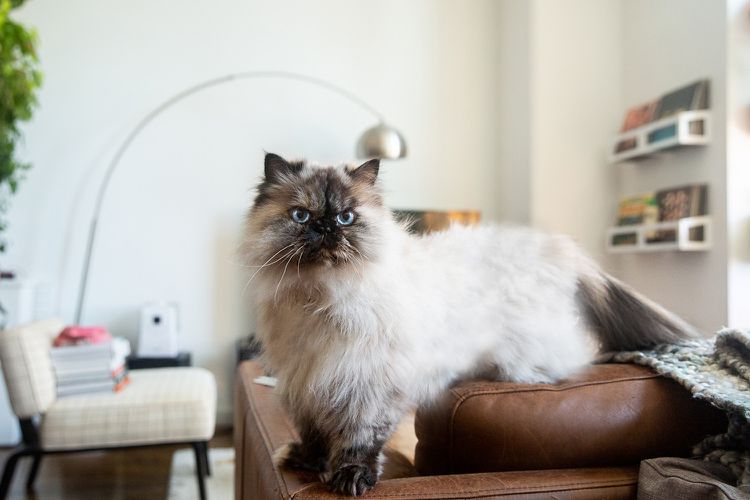
12 Most Popular Cat Breeds for Feline Lovers
These 12 cat breeds, like the Siamese and Sphynx, are known for their unique appearances and personalities. Learn what makes them so popular.
Balinese: Cat Breed Profile, Characteristics & Care
The Balinese cat is playful, sociable, elegant, intelligent, and a touch on the vocal side. Learn about the Balinese, including appearance, temperament, health, and care needs.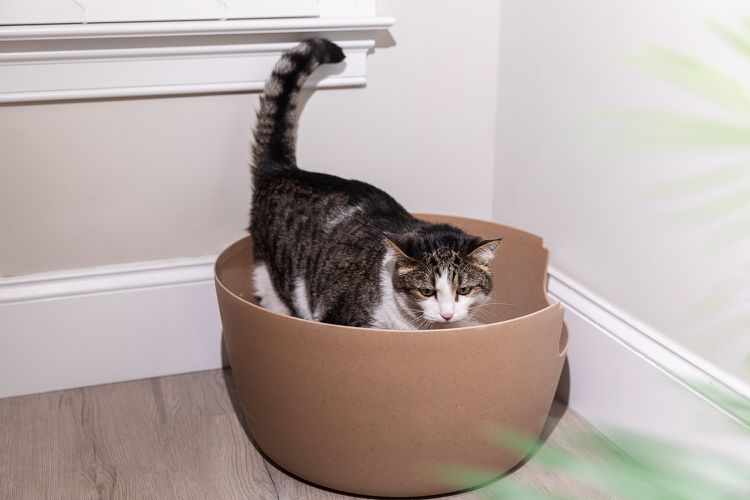
Why Cats Don't Always Cover Their Poop
Cats may not cover their poop for a few different reasons, including being territorial, sending a message to their owner, and not liking the litter.
Cavapoo: Dog Breed Characteristics & Care
The Cavapoo is a hybrid of the Cavalier King Charles spaniel and a toy or miniature poodle. Learn why these teddy-bear-looking dogs make the perfect addition to your family.
Why Dogs Eat Poop and How to Stop Them
Is your dog eating poop? Some dogs do this because of stress or illness. Learn how to prevent stool eating, or coprophagia, in dogs.
Can Dogs Get Depression? How to Help Your Sad Dog
Can dogs get depression? Learn about the signs of depression in dogs and find out how to help your sad dog.
4 Reasons Why Your Dog Licks Their Butt
Butt-licking in dogs can be a part of normal grooming, but excessive butt-licking is not normal. Read about the most common reasons for this behavior.